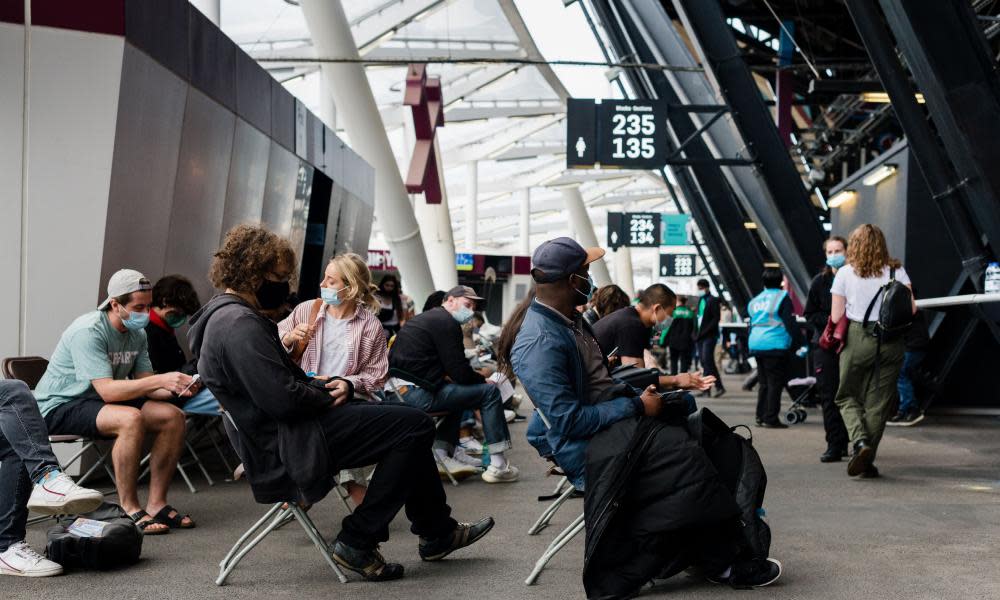Under-18s could be ‘reservoirs’ for virus when all adults are jabbed, expert warns

The drive to vaccinate all adults over the age of 18 in the UK could lead to the concentration of Covid-19 cases in schoolchildren, a leading British virologist has warned.
Under-18s would then become reservoirs in which new variants of the virus could arise, said Julian Tang, of Leicester University.
Tang was speaking as Public Health England revealed a 79% rise in one week in cases of the Delta variant of Covid, first identified in India. A race is now on between the vaccination programme and the emergence of a third wave of the virus, say scientists.
Many believe there are grounds for cautious optimism that the vaccine will hold back hospitalisations and deaths in the wake of rising case numbers triggered by last month’s partial release of lockdown measures, as well as the arrival of the Delta variant.
Watch: Over 18s start getting vaccinated
However, Tang sounded a note of caution. Most recent data indicates that the main focus of infections was now in the under-30s who have not yet been extensively vaccinated, he said. “The predominance of the Delta variant over the previous Alpha variant now confirms an increased transmissibility over this earlier variant - and a much higher transmissibility over the original virus,” he added.
As the Covid-19 vaccination programme progressed into younger and younger age groups, this process would drive the virus into the under-18s, who are not yet scheduled to be vaccinated. “As a result, the virus will concentrate in school-age populations, which will eventually become a reservoir and driver of any ensuing Delta variant epidemic, as well as being a hotspot in which new mutations may arise,” Tang said.
Such developments would increase pressure on the government to give the go-ahead to Covid vaccination programmes for children and teenagers, although Liz Truss, the international trade secretary, said last week she understood the Joint Committee on Vaccination and Immunisation would not be recommending such a move in the short term.
The move to vaccinate children has been criticised by global health leaders. They point out that in low and lower-middle income countries, Covid-19 vaccine supplies have been so poor that healthcare workers are not being immunised while hospitals are being inundated with the sick and dying. They are calling for these nations to be prioritised for vaccination programmes.
Watch: Lockdown restrictions - what is changing, what is staying the same and why?
The government has also stressed its commitment to removing the last lockdown measures on 19 July – action that was postponed last week for four weeks to try to hold back the rising number of cases. Such a move would lift the final restrictions on social life in the UK, including holiday home sharing, nightclubbing and attending concerts.
“Crowd events are providers of a sense of wellbeing for a lot of people,” psychologist Professor John Drury, of Sussex University, told the Observer. “Individuals who don’t enjoy being in large crowds might not care about the last restrictions that are still being maintained but if major events continue to be blocked or restricted by the government that could be a hammer blow for a lot of individuals.”
Ivo Vlaev, professor of behavioural science at Warwick University, added that if the government was forced to reintroduce Covid-19 restrictions in future in response to a new wave of infections it should take care to avoid taking an intermittent, “on-off” approach.
“If some of the restrictions are reintroduced, it must be clear what the changes are and how people should act,” Vlaev said. “The advice should be brief and to the point, as there is some evidence that brief messages are more effective at convincing people to change their behaviour. Information about the outbreak and the quarantine protocols also needs to be clear and consistent, and not open to interpretation.”
Watch: What you need to know about COVID-19 variants

 Yahoo Movies
Yahoo Movies 
